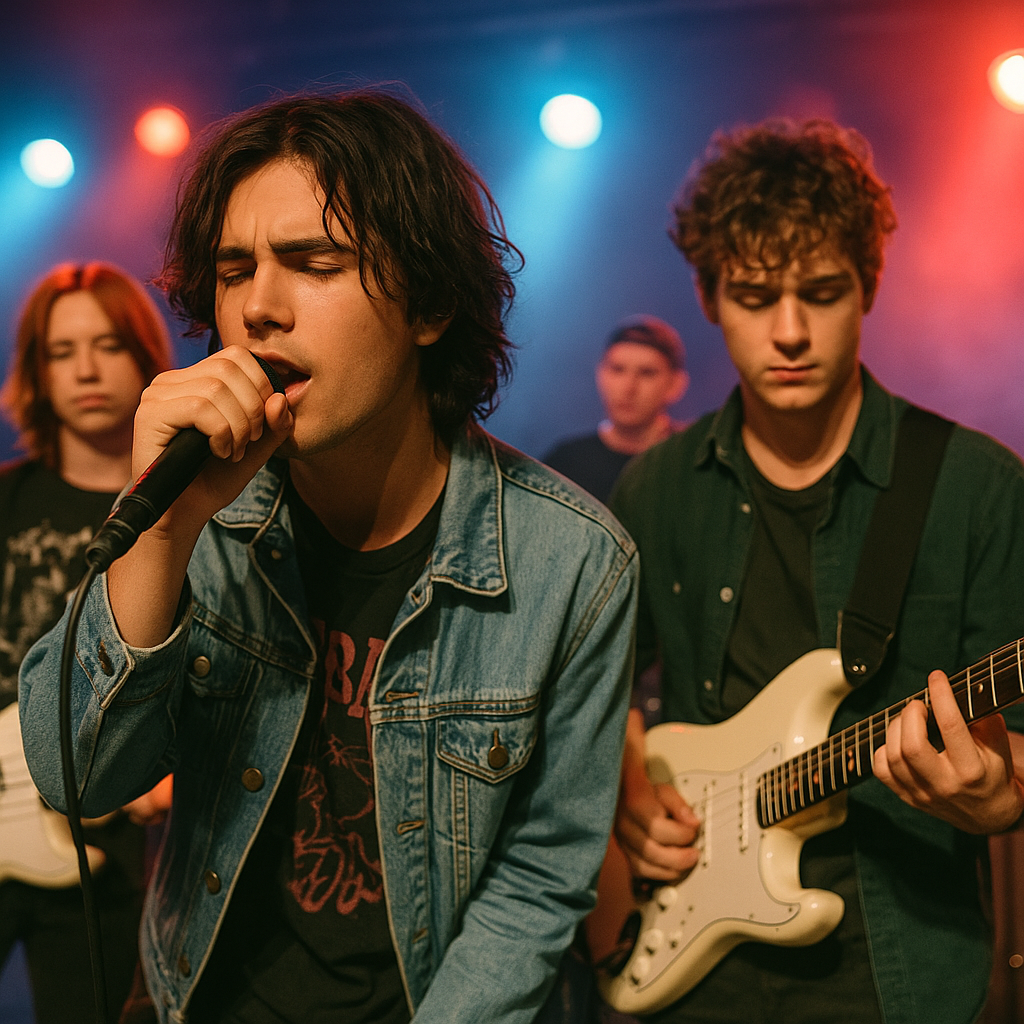In 1999, a teenager named Shawn Fanning upended the entire music industry with a college dorm-room project called Napster. His peer-to-peer file-sharing service marked the dawn of an era when music could be copied, shared, and downloaded without regard for copyright, shattering revenue models and rewriting the relationship between artists and audiences overnight.
Fast forward to 2025, and the music industry stands on another precipice. This time, the disruptor isn’t a scrappy software student but an entire technological frontier: artificial intelligence. AI’s ability to mimic, generate, and manipulate music is advancing at breakneck speed. Artists’ voices can be cloned with eerie accuracy; compositions can be conjured from prompts in seconds. While some hail this as the ultimate creative democratization, record labels and rights holders see a chilling déjà vu — the ghost of Napster, reborn in code.
Can the industry — now older, wiser, and armed with legal precedent — make AI the next Napster? Or are we entering an unstoppable new age where creativity itself is up for grabs?
The Original Digital Uprising: Napster’s Legacy
To understand the current AI crisis, one must revisit Napster’s seismic impact. In its heyday, Napster attracted over 80 million users worldwide, enabling free sharing of MP3 files and, by extension, fueling widespread music piracy. Record sales plummeted, lawsuits erupted, and Metallica, once considered rebellious icons, became unlikely antagonists in a courtroom showdown against their own fans.
Ultimately, Napster was shut down by court order in 2001, but the Pandora’s box it opened would never close. From LimeWire to BitTorrent, decentralized digital sharing spread rapidly, forcing the industry to pivot. The eventual rise of iTunes and, later, Spotify showed that accessibility and convenience — not just legality — would drive the next era of music consumption.
The Napster saga taught the industry that draconian crackdowns alone wouldn’t win the war; innovation in distribution and monetization was necessary. But it also instilled a lingering trauma: a fear of any technology that threatened to democratize access too radically.
AI Enters the Studio: From Tool to Creator
While AI in music isn’t entirely new (think of early experiments in algorithmic composition in the 1980s and 1990s), recent breakthroughs have escalated the stakes dramatically. Today’s AI systems can generate full-fledged songs in the style of Drake, mimic the lush chord voicings of John Coltrane, or even create brand-new pop stars without human performers at all.
Companies like OpenAI, Google DeepMind, and startups like Boomy and Soundful have developed tools allowing anyone to produce music at the click of a button. Some of these tools are designed as assistive co-creators, helping producers ideate melodies or chord progressions. Others, more controversially, generate entire vocal tracks using AI-trained voice models of real artists.
The shift from using AI as a tool to seeing it as a full-blown creator has ignited an ethical and legal firestorm. Can a machine infringe on human artistry? Who owns the rights to an AI-generated Drake hit? What happens when anyone can become an instant pop producer without ever stepping into a studio?
Copyright Law: The Music Industry’s Special Armor
One of the most powerful weapons in the music industry’s arsenal is copyright law — but it operates in a uniquely nuanced ecosystem.
Copyright in music isn’t monolithic; it covers multiple layers: the composition (notes and lyrics), the sound recording (the actual performance captured), and sometimes even arrangements and sampled elements. In the United States and most jurisdictions, only works created by humans are eligible for copyright. An AI-generated song, technically, cannot claim copyright protection on its own. This nuance ironically exposes AI music to “copycat” risk, since no one owns the output in the traditional sense.
However, when AI models are trained on copyrighted material — millions of songs, vocals, and performances — the data used to “teach” the AI often involves unauthorized copying. This is where the industry is striking back, wielding not just copyright infringement claims but also doctrines like “right of publicity” (protection against unauthorized commercial use of a person’s voice or likeness).
Earlier this year, Universal Music Group spearheaded a lawsuit against several AI music startups, alleging that training on their catalogs constitutes massive, unauthorized use. The move mirrors early lawsuits against Napster, with record labels deploying their legal firepower to defend artist rights (and, cynically, revenue streams).
Artists’ Perspectives: Ally or Enemy?
Interestingly, artists themselves are divided. On one side, prominent musicians see AI as a theft engine — a means for others to profit from their style and persona without compensation or control. In 2023, Drake famously condemned an AI-generated song that replicated his voice, calling it “the last straw.” Similar outcries have come from artists like Nick Cave, who argued that AI can never replicate the “suffering” embedded in human songwriting.
On the other side, some independent musicians and producers embrace AI as a creative catalyst. They see it as a democratizing force, breaking the gatekeeping of major labels and offering new ways to create and distribute music globally.
This echoes the Napster era, when some artists sided with peer-to-peer platforms as a form of rebellion against label hegemony. Today, the tension between creative freedom and protection is more pronounced than ever.
The Rise of “Deepfake Music” and Public Reaction
In recent years, “deepfake music” has become a term of concern and curiosity. Viral tracks featuring AI-generated Kanye West verses or entirely synthetic Frank Ocean songs have racked up millions of views before being swiftly taken down.
Unlike Napster, where fans shared authentic copies of songs, AI enables the creation of completely new content — music that never existed in an official discography. This raises not just legal challenges but also existential ones: what is “real” music, and does authenticity matter to listeners as much as we assume?
A growing segment of fans seem less concerned with authorship and more interested in accessibility and novelty. This hints at a cultural shift that may eventually outpace legal frameworks.
Labels Strike Back: Lawsuits and Lobbying
Record labels have begun a multi-pronged counteroffensive:
-
Litigation: Major lawsuits against AI platforms for infringing on catalog rights and artist likenesses.
-
Legislation: Lobbying for updated copyright laws that account for AI-specific challenges, including potential rights for voice models and data sets.
-
Partnerships: Some labels are exploring controlled collaborations with AI companies to harness the technology under license rather than fight it blindly.
The Recording Industry Association of America (RIAA) has even proposed a “model license” for AI companies, akin to the mechanical licensing regime that governs song covers. This approach seeks to create a pathway for legal AI music generation while preserving revenue for rights holders.
Lessons from Napster: Adaptation Over Eradication
If Napster taught the industry anything, it’s that technological innovation cannot be simply litigated out of existence. Attempts to destroy file-sharing failed; the industry only survived by inventing more compelling legal alternatives (Spotify, Apple Music, Bandcamp).
Similarly, AI music may be unstoppable. The real question isn’t whether AI can be banned, but whether the industry can adapt to integrate it meaningfully. Potential solutions include AI licensing frameworks, new artist agreements covering likeness rights, and equitable revenue-sharing models for AI-generated works.
Ethical and Philosophical Implications
Beyond law and commerce lies a deeper debate: should machines make art? Can a neural network capture the heartbreak of Adele or the intricate lyricism of Kendrick Lamar? What does it mean for culture when anyone can instantly “own” an AI-generated Beatles album?
Some argue that creativity is fundamentally human — a process of lived experience, emotion, and vulnerability. Others suggest that AI is just another tool, like the electric guitar or drum machine once were, expanding the palette of what is possible.
These philosophical questions will shape not just the music industry’s future but the trajectory of art itself.
Looking forward, we can expect:
-
Hybrid Collaborations: Artists using AI as co-creators, blurring the line between human and machine authorship.
-
Micro-licensing Models: Fans commissioning personalized tracks in an artist’s style via authorized AI.
-
Consumer Empowerment: DIY music creation tools democratizing the industry further, eroding traditional power structures.
-
Stronger Legal Protections: A push for “voice rights” laws and AI-specific copyright amendments globally.
Is AI the next Napster? In some ways, yes — it disrupts, democratizes, and terrifies established players. But it is also fundamentally different. Where Napster was about distribution, AI is about creation itself.
Rather than another illegal file-sharing saga, we may be witnessing the dawn of a new creative renaissance — one that will require not just lawsuits but imagination, new laws, and cultural soul-searching.
The music industry stands at a fork: cling to the past or orchestrate a future where AI and artists create in harmony. The final chorus has yet to be sung.
No comments yet.







